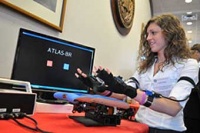Constantinos Mavroidis, professor of Mechanical and Industrial Engineering; Maureen Holden, associate professor of Physical Therapy and doctoral student Mark Sivak advised the team on the development of the device, which is formally known as the Angle Tracking and Location at Home System (ATLAS) bimanual-rehabilitation glove.
The project sought to offer real-world solutions to a rehabilitation challenge and did so by combining the knowledge of physical therapists and engineers, said Holden.
‘In this project we were trying to develop a low-cost virtual-environment-based glove system that can be used for motor retraining of the arm, hand, fingers and thumb in patients who have suffered a stroke,’ Holden said. ‘The idea was to keep the cost low enough and the features simple enough that patients can afford to buy one and use it independently in their homes.’
Sivak noted that stroke patients often couldn’t continue with physical therapy, either because they can’t drive to the location or it’s too expensive. ‘With the glove, the idea is to create an affordable, at-home mechanism to help them regain fine motor skills.’
The glove works through a series of sensors that provide resistance in hand exercises. The glove is wired to a computer, which displays virtual-reality games that sync to hand exercises, Sivak said, explaining that the games add an element of fun to the therapy.
The students on the project team included Jason Chrisos, Caitlyn Bintz, Drew Lentz, Andrew Clark and Avi Bajpai.

Undergraduate researcher Caitlyn Bintz tries on the stroke-rehabilitation glove. Photo by Craig Bailey




Poll: Should the UK’s railways be renationalised?
Rail passenger numbers declined from 1.27 million in 1946 to 735,000 in 1994 a fall of 42% over 49 years. In 2019 the last pre-Covid year the number...